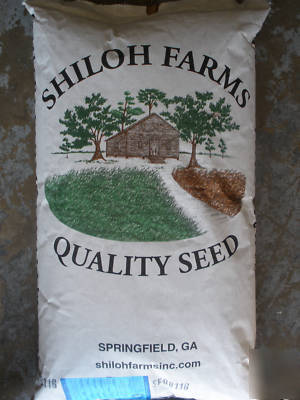Tristate Machinery Dismantlers Forum > WISCONSIN
> Industrial Machines
> New
> With Warranty
> Tifquik certified bahia grass seeds 75% faster germ 40#
Tifquik certified bahia grass seeds 75% faster germ 40#
Shiloh Farms - Bahia Grass Seed
Shiloh Farms is a major producer of grass seed located in Springfield, GA, near historic Savannah. It has been a family-owned business for over three decades and currently has two generations working on the farm. For most of its existence, the company has been producing, cleaning and processing certified seed.
In the late 1990s, Shiloh Farms began producing certified Tifton 9 bahia grass seed. Since then, they have become the largest producer of certified grass bahia seed in the Southeast, known for their quality and seed production.
In 2005, the Georgia Seed Development Commission chose Shiloh Farms to produce the first large-scale TifQuik foundation seed plot in Georgia. Because of Shiloh Farms' location and sandy soils, TifQuik is well-suited to the area. Since Shiloh Farms has been producing TifQuik, they have discovered that it is a very hardy cultivar, being able to produce more tonnage with less fertilizer and less precipitation than other warm season grasses, including Tifton 9. TifQuik also emerges faster, and therefore covers the field faster than Tifton 9, eliminating the opportunity for weed seed to emerge and provides for earlier grazing and earlier harvesting.
Shiloh's observations of TifQuik confirm the research that Bill Anderson of the USDA-ARS Genetics and Breeding Unit in Tifton, GA has experienced with his greenhouse studies and replicated outdoor plots in Tifton.
When you are looking for bahia grass seed, be sure to contact Shiloh Farms, Inc.
TifQuik Bahia Grass Seed For Faster Pasture Grass
TifQuik Bahia Grass Seed released by the USDA and UGA (University of Georgia), TifQuik Bahia Grass shows great promise for forage growers who wish to get a jump on weeds and extend their grazing and hay production season.
Features of TifQuik Bahia Grass For Pasture
* Reduced hard seed - providing quick establishment
* Faster Germination - 75% Faster than Tifton9 and Pensacola Bahia Grass in field trials
* Early Spring Frost Recovery
* TifQuik seeded pastures will be covered earlier
* Grazing or hay removal can be started sooner
* Dry matter yields were 2 times higher than Tifton9 and 4 times higher than Pensacola 2 months after planting - See Chart Below
Planting Information For TifQuik Bahia Grass Seed
Planting Date: Spring - Mid-Summer
Planting Depth: 1/8 - 1/4 inch. Do not plant any deeper or seed will not germinate.
Seeding Rate: 25 to 30 lb/acre
TifQuik Bahia Grass Yield Comparison Table
Dry Matter Yield - Year 1 (2003)
Development of TifQuik Bahia Grass
Forage growers would naturally like to get the jump on weeds and extend their forage production season. So Agricultural Research Service geneticist Bill Anderson of the Crop Genetics and Breeding Research Unit in Tifton, Georgia, and his colleagues have developed a new bahiagrass (Paspalum notatum) cultivar that may help them do just that.
Released by the U.S. Department of Agriculture (USDA) and the University of Georgia (UGA) TifQuik has great promise as a forage grass in the Southeast. Currently, Tifton 9 bahiagrass, another USDA/UGA variety, developed by the late Glenn Burton, an ARS Hall of Fame member, is widely grown for forage, with good results. But the TifQuik cultivar is even better.
TifQuik was developed to have reduced hard seed and thus faster germination and field establishment than Tifton 9, says Anderson. These features mean that a TifQuik-seeded pasture will be covered earlier, and grazing or hay removal can be performed sooner with higher initial yields.
The bahiagrass cultivars now grown have a considerable amount of hard seed and thus require 2-3 weeks to establish a full stand. During this time, weeds may infest the pasture, and moisture for forage seed germination may be restricted.
In developing TifQuik, the sole criterion for selection of plants was fast germination. It took 4 years to achieve the desired qualities. Former ARS agronomist Roger Gates and retired geneticist Wayne Hanna performed the four selection cycles, beginning with Tifton 9. During each cycle, enough seed was planted from the previous one to obtain 1,000 seedlings that germinated within the first week. Seedlings were transplanted to clay pots in the greenhouse and then to a fumigated field to establish a nursery. Plants were allowed to cross-pollinate, seed was hand-harvested, and that seed was then used to start the final cycle, the following spring, in a greenhouse. The four cycles were completed in 2002, and the seed from 2002 was used to establish greenhouse germination tests and a replicated field test and to begin seed increase.
In the greenhouse studies, germination of TifQuik averaged five times more than Tifton 9 after 6 days and three times more after 8 days. In the field studies, TifQuik emerged about 75 percent faster after 1 week than Tifton 9 and Pensacola, another commonly used forage bahiagrass. After 4 weeks, TifQuik plants were taller than both Tifton 9 and Pensacola. Dry-matter yields of TifQuik were two times higher than Tifton 9 and four times higher than Pensacola for the first clipping, which was done 2 months after planting.
TifQuik will be particularly valuable to growers who wish to include bahiagrass in a sod-based rotation system with row crops such as peanut and cotton in the southeastern United States, says Anderson. Bahiagrass has been shown to reduce nematode and disease problems in subsequent crops, and it should provide many forage growers with another tool to make their operations more efficient and, hopefully, more profitable.
By Sharon Durham, Agricultural Research Service Information Staff.

